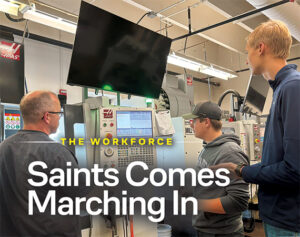This year’s State of Manufacturing® focus groups revealed a continuing concern about finding qualified employees, particularly in certain industries and geographic regions. Equally troubling, executives describe a lack of understanding among the next generation of employees when it comes to the fundamental expectations of the workplace, what we often term “essential skills.”
At St. Francis High School, students are acquiring a complete set of manufacturing skills as they work with advanced equipment, each other, and a big-time customer to generate income for their program. Featured in this article, the program addresses many of the concerns outlined by manufacturers during this year’s focus groups.
We conclude every focus group session by asking participants to identify the one issue that gives them heartburn.
During one metro area focus group, executives lamented that finding reliable, quality employees is their what-keeps-me-up-at-night issue. They explained why: Ten interviews are scheduled for a day, and one applicant actually shows up. Employees show up the first day and get injured within an hour of starting. They have substance abuse problems and harm themselves outside of work, leading to extended absence and a short-term disability claim. Huge numbers of employees are within a year or two of retirement. Workers show up just for the paycheck and don’t want to work, learn, and grow.
It’s a disturbingly low but often unmet standard: to have employees who come to work to, well, work. And many employees lack the attributes that allow them to work productively in a group, remain committed to a job, and understand that their contribution will be missed if they don’t show up or fall short of expectations.
Enter Saints Manufacturing, which transforms high school students into manufacturing team members and leaders who generate income for their program by marketing and selling their products to paying customers. Students in the career and technical education program at St. Francis High School start out in typical fashion, taking entry-level classes in general metals, metal tech, and welding.
From the students who complete those classes, a select group joins Saints Manufacturing, a class that combines further experience in skilled manufacturing with real-world demands. About 95% of Saints’ output is for the Minnesota Department of Transportation (MnDOT) with the production of parts for plow trucks, shop carts, push pulls, and more.
In addition to earning money for their program, which they reinvest in advanced machinery, students learn about estimating, deadlines, common production problems, labor costs, and delivery. They deal with vendors and serve as foremen. The result: The students in Saints Manufacturing hone their skills in welding and CNC machining as they develop and refine equally valuable essential skills.
Students interviewed for the feature offered thoughtful, articulate comments about how the program prepares them for future careers, in manufacturing or any field. They’re conversant in quality inspections, vendor relationships, and workflow. They exude enthusiasm about their work.
We’ve seen it repeatedly as we’ve helped manufacturers grow. A company with a handful of great employees, a novel market, and an excellent strategy soon doubles in size, and then it does it again, and again. Manufacturing success stories will continue to fuel Minnesota’s economic growth — if companies have what they need to expand, including an outstanding workforce. Programs like Saints Manufacturing are poised to help fill that gap.
The program’s director, Erik Trost, built Saints Manufacturing after attending a workshop at a high school in Wisconsin that offers a similar program. Trost is now considering offering a workshop for Minnesota high schools to help them launch their own programs. For Minnesota’s manufacturers, that can’t happen soon enough.
Return to the Winter 2025 issue of Enterprise Minnesota® magazine.


